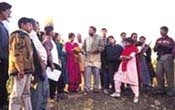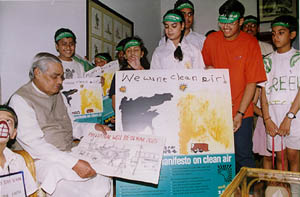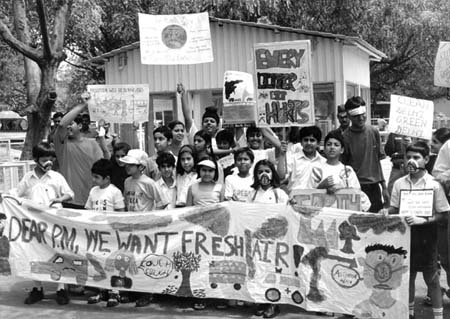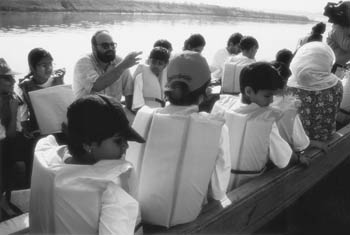HAPPENINGS
GOBAR TIMES EDUCATIONAL
ECO-TOUR-20th
of December 2000
 There is more than what meets the eye. Gobar Times tries to
stimulate young minds into questioning existing social and economic conditions. As part of
its ongoing efforts in Environmental Education GT had in one of its issues, elicited
responses from its young readers to the question There is more than what meets the eye. Gobar Times tries to
stimulate young minds into questioning existing social and economic conditions. As part of
its ongoing efforts in Environmental Education GT had in one of its issues, elicited
responses from its young readers to the question

Auto Expo 2000: Children demand their
right to clean air!
 Children presented their demands for their right to clean air to
the Chairperson of SIAM (Society for Indian Automobile Manufacturers), Mr Venu Srinivasan,
at the Auto Expo 2000. Children presented their demands for their right to clean air to
the Chairperson of SIAM (Society for Indian Automobile Manufacturers), Mr Venu Srinivasan,
at the Auto Expo 2000.
At the Auto Expo 2000, a team of enthusiastic student
reporters produced a special edition of Gobar Times which focused on increasing population
of vehicles on Delhi roads and the resulting air pollution due to vehicular emissions.
They spoke to various automobile manufacturers, officials of Society of Indian
Automobile Manufacturers (SIAM) and consumers on the issue of air pollution. They also
interviewed the Chief Minister of Delhi, Ms Sheila Dikshit, on what her government is
doing to curb the menace of air pollution.
The young reporters presented this special edition of Gobar Times to Mr Venu
Srinivasan, Chairperson, SIAM, at Pragati Maidan.

Earth Day
2000: Children's Cycle Rally
A cycle rally of hundreds of school children
from Delhi culminated at the Prime Minister's Residence on Earth Day. They highlighted the
issue of air pollution in Indian and appealed to the government and the automobile
manufacturers to show genuine concern and take effective action to protect their health.
Children could be seen cycling enthusiastically, carrying placards and raising their
demand for clean air.
 "WE WANT CLEAN AIR" "WE WANT CLEAN AIR"
Children Presented a
Manifesto on Clean Air to the Prime Minister of India
On behalf of all the children of India, a delegation of 22 children presented the
Hon'ble Prime Minister of India , Shri Atal Bihari Vajpayee, a Children's Manifesto on
Clean Air , a part of CSE's Right to Clean Air Campaign. They drew the attention of
government and the automobile manufacturers to the serious issue of deteriorating air
quality in towns and cities of India.
This children's Manifesto was based on contributions, text and drawings, sent by
children across India - as a part of many Earth Day events organised by numerous
organisations in other parts of the country.


Environmental
Education Workshop on Earth Day 2000
To commemorate Earth Day, a
two-day workshop on Environment Education was conducted on April 21-22, 2000. 27 educators
from 18 institutions - schools and NGOs across the country attended the workshop and the
Earth Day activities. The workshop was organised at India Habitat Centre, New Delhi. The
focus was on "Sustainable Cities" and "replicating the Ecological
Footprint Project in your city or town".

Launch of the
Ecological Footprint Project Ecotours
The Ecological Footprint Project was
initiated in May 1998 with the Yamuna Yuk-Ride.
 The Yuk-Ride took fifty school children from 12 schools on
a boat ride down the Yamuna accompanied by experts from CSE, CPCB and Development
Alternatives. The students were provided with cameras to photograph their experiences on
the ride. This was the first of a series of events planned as part of the Environment
Education Unit’s Ecological Footprint Project’s package of 4 eco-tours
for Delhi schools - the Yamuna, traditional water harvesting sites, the Delhi Ridge and
waste disposal in Delhi. The Ecological Footprint Project plans to address the lack
of perspective of students towards their city’s environment and the symbiotic
relationship that exists between a city and its inhabitants. The neglect and degradation
of our rivers, and especially the Yamuna, in Delhi’s context, seemed like a good
place to start. And so the Yamuna it was. The Yuk-Ride took fifty school children from 12 schools on
a boat ride down the Yamuna accompanied by experts from CSE, CPCB and Development
Alternatives. The students were provided with cameras to photograph their experiences on
the ride. This was the first of a series of events planned as part of the Environment
Education Unit’s Ecological Footprint Project’s package of 4 eco-tours
for Delhi schools - the Yamuna, traditional water harvesting sites, the Delhi Ridge and
waste disposal in Delhi. The Ecological Footprint Project plans to address the lack
of perspective of students towards their city’s environment and the symbiotic
relationship that exists between a city and its inhabitants. The neglect and degradation
of our rivers, and especially the Yamuna, in Delhi’s context, seemed like a good
place to start. And so the Yamuna it was.
If we wanted to jolt the kids out of their apathy, we couldn’t
have chosen a better way. Comments like "But....it looks like Coke, not water!"
and "I heard that the Yamuna was in a bad shape, but I never dreamed that it could be
like this" were heard on each of the five boats, but nothing could match their
chagrin when they saw children, their own age, bathing and swimming in, and drinking the
filthy smelly water. As the sun grew hotter, methane fumes rose off the black surface
silencing the chatter and drawing out hankies.
Later in the day, at the IHC office, some of the children prepared a
special edition of Gobar Times with the help of professionals from the field of
journalism and editorial design closely supervising, while others prepared a colourful
photograph and painting exhibition based on their experiences. Young students trained by
the Delhi Environment Action Network (DEAN) demonstrated how to test the water quality of
the samples collected on the boat-ride. Besides getting to know about the Yamuna, the
exercise aimed to give the student-investigators hands-on experience in these professions.
The drawing- and painting-exhibits made colourful splashes on the polished granite the
next day, while the photographs and crayoned slogans like "Yamuna smells, looks like
hell", "I don’t want the Yamuna to die" and "I want a change in
the attitude of people" contrasted grimly with the plush surroundings. |